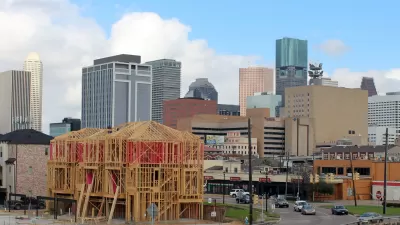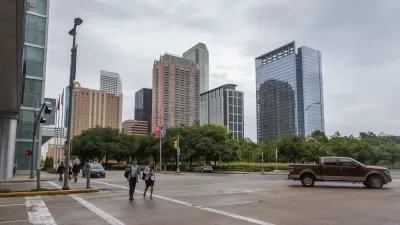Houston is famous in planning circles for lacking a zoning code, but that doesn't mean planners don't have plenty of tools to determine the future of the city.

William Fulton details the realities of land use in Houston, or, as Fulton describes it, "the largest city in the country with no zoning."
Houston is the fourth-largest city in America, with a population of 2.3 million people spread across more than 600 square miles. It contains some of the densest job centers and ritziest residential neighborhoods in the country. Yet three times in the last century — most recently in 1993 — Houstonians have voted down that most elemental of planning policies, zoning based on use. It's the first thing any planner — indeed, almost any person — asks about when they ask about Houston.
The key distinction Fulton teases out here, is that just because there is no zoning, doesn't mean there is also no planning in Houston. Houston has a frustrating development code, according to Fulton—and even zoning, in its own unique way.
"In reality, Houston is a big mixture of ordinances, policies, tactics by neighborhoods, and independent efforts by nonprofits, all of which play a role in determining how land is used," explains Fulton. "The city is rife with plans, strategies, and other efforts to create more walkability, bring new investment into historically underserved communities, and protect the city against future flooding and other hazards."
Fulton pinpoints planning in Houston to three key efforts, each with a lot more detail provided in the source article: 1) planning for the public realm, 2) planning tools for zoning workarounds, and 3) a market-driven development code.
FULL STORY: The 'Z' Word

Alabama: Trump Terminates Settlements for Black Communities Harmed By Raw Sewage
Trump deemed the landmark civil rights agreement “illegal DEI and environmental justice policy.”

Study: Maui’s Plan to Convert Vacation Rentals to Long-Term Housing Could Cause Nearly $1 Billion Economic Loss
The plan would reduce visitor accommodation by 25% resulting in 1,900 jobs lost.

Planetizen Federal Action Tracker
A weekly monitor of how Trump’s orders and actions are impacting planners and planning in America.

Waymo Gets Permission to Map SF’s Market Street
If allowed to operate on the traffic-restricted street, Waymo’s autonomous taxis would have a leg up over ride-hailing competitors — and counter the city’s efforts to grow bike and pedestrian on the thoroughfare.

Parklet Symposium Highlights the Success of Shared Spaces
Parklets got a boost during the Covid-19 pandemic, when the concept was translated to outdoor dining programs that offered restaurants a lifeline during the shutdown.

Federal Homelessness Agency Places Entire Staff on Leave
The U.S. Interagency Council on Homelessness is the only federal agency dedicated to preventing and ending homelessness.
Urban Design for Planners 1: Software Tools
This six-course series explores essential urban design concepts using open source software and equips planners with the tools they need to participate fully in the urban design process.
Planning for Universal Design
Learn the tools for implementing Universal Design in planning regulations.
Caltrans
Smith Gee Studio
Institute for Housing and Urban Development Studies (IHS)
City of Grandview
Harvard GSD Executive Education
Toledo-Lucas County Plan Commissions
Salt Lake City
NYU Wagner Graduate School of Public Service





























